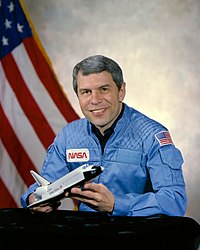Robert A. Parker
| Robert Parker | |
|---|---|

|
|
| Country: | United States |
| Organization: | NASA |
| selected on | October 4, 1967 ( 6th NASA Group ) |
| Calls: | 2 space flights |
| Start of the first space flight: |
November 28, 1983 |
| Landing of the last space flight: |
December 11, 1990 |
| Time in space: | 19d 6h 52min |
| retired on | August 31, 2005 |
| Space flights | |
Robert Allan Ridley Parker (born December 14, 1936 in New York City , New York , USA ) is a retired American astronaut .
education
Parker graduated from Shrewsbury. He then studied astronomy and physics at Amherst College and successfully completed both subjects with a bachelor's degree in 1958 . He then received his PhD in astronomy from the California Institute of Technology in 1962. During the astronaut training he was a professor at the University of Wisconsin-Madison .
NASA
In 1967 he was elected to NASA's 6th astronaut group and trained as a science astronaut . He was part of the scientific support team for the Apollo 15 and Apollo 17 missions . He was also a research fellow for the Skylab missions.
He has over 3,500 flying hours in jets on his account.
STS-9
Parker had his first and longest space mission as a mission specialist for the STS-9 mission from November 28 to December 8, 1983 with the Columbia space shuttle , which included the Spacelab space laboratory for the first time . Under the command of astronaut John Young , who became the first person to fly into space for the sixth time on this mission, it was the first space flight with six space travelers. It was also the first NASA mission that a non-American, Ulf Merbold , was a member of the crew.
From a scientific point of view, the flight was a complete success, because by carrying the Spacelab more experiments could be carried out successfully than in all the Apollo and Skylab missions combined.
STS-61-E
This mission with the space shuttle Columbia should have brought the ASTRO-1 Spacelab mission into space in March 1986. The flight was canceled after the Challenger disaster . The team would have consisted of Jon McBride , Richard Richards , David Leestma , Jeffrey Hoffman , Robert Parker, Samuel Durrance and Ronald Parise .
STS-71-A
This mission with the space shuttle Atlantis should have brought the ASTRO-2 Spacelab mission into space on January 12, 1987. The flight was canceled after the Challenger disaster. The team would have consisted of Jon McBride , Richard Richards , David Leestma , Jeffrey Hoffman , Robert Parker, payload specialist Kenneth Nordsieck and one of the two other payload specialists Samuel Durrance and Ronald Parise .
STS-35
On his second and final space mission, Parker was again on board the Columbia as a mission specialist. The main objective of the mission was astronomical observations with the devices of the ASTRO-1 platform in the range of UV and X-rays.
On this flight there were take-off delays, so that for the first time in history, two space shuttles were ready to take off on the launch pad at the same time.
There were some technical problems during the mission, for example the displays for aligning the ASTRO-1 telescopes did not work. The telescopes therefore had to be controlled from Earth. The scientific goals could still be achieved to about 70 percent.
After the flights
Parker was stationed at NASA Headquarters in Washington DC from March 1988 to December 1991 as director of policy and plans for the space shuttle project. From 1992 to 1993 he was director of the Spacelab program and from 1993 to 1997 he was responsible for the utensils of the space missions. From 1997 until his retirement in 2005, he was director of NASA's propulsion laboratories in Pasadena .
Summary
| No. | mission | function | Flight date | Flight duration |
|---|---|---|---|---|
| 1 | STS-9 | Mission specialist | November 28 - December 8, 1983 | 10d 07h 47m |
| 2 | STS-35 | Mission specialist | December 2 - December 11, 1990 | 8d 23h 05m |
Private
Parker is married with five children and nine grandchildren.
See also
- List of spacemen
- Country statistics of manned spaceflight
- List of space shuttle missions
- List of manned space flights
Web links
- Short biography of Robert A. Parker at spacefacts.de
- NASA biography of Robert A. Parker (English; PDF)
- Biography of Robert A. Parker in the Encyclopedia Astronautica (English)
| personal data | |
|---|---|
| SURNAME | Parker, Robert A. |
| ALTERNATIVE NAMES | Parker, Robert Allan Ridley |
| BRIEF DESCRIPTION | American astronaut |
| DATE OF BIRTH | December 14, 1936 |
| PLACE OF BIRTH | New York City , New York State, USA |
